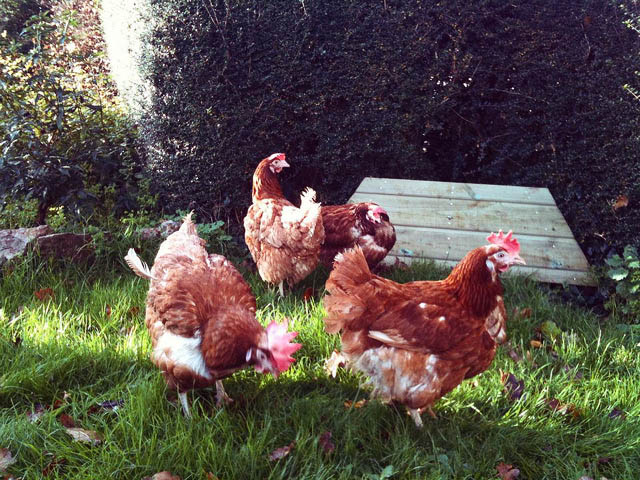Keeping Animals on your Allotment

Animals make an amazing addition to any allotment for a number of reasons; they give your plot an authentic, rural feeling, as well as adding a lot of character to your plot. What’s more - in the case of bees – they can even pollinate your crops, increasing the quality of your produce! While it is often seen as an allotmenter's right to keep certain animals, there are regional and local differences in what your plot can be home to - and various responsibilities come with keeping animals. Here, we’ve compiled a list of the animals most commonly kept on allotments, as well as how to ensure their wellbeing and the main considerations to bear in mind.
If you’re thinking about introducing animals to your plot, three of the most popular are rabbits, hens and bees, each of which provide unique benefits and challenges to the keen allotmenter.
Hens
Hens are the epitome of country living, and they can add a huge amount of joy to you and your family with their dazed rushing around, bright colours and friendly clucking! Not to mention, hens at the height of their laying can provide you with around 5 delicious eggs a week, so two or three could easily keep your family stocked up. It’s important not to keep more hens than will feed your family on your allotment, as keeping their produce for commercial use is banned, and there’s no point in looking after and feeding more chickens than you need. You’ll find that many allotments don’t permit you to keep cockerels because they are noisy and have a tendency to be aggressive; if you do plan to keep them, be sure to check that it’s alright with your landlord and neighbours first.
When looking after chickens, you will need a henhouse to keep them protected, warm and happy. Many predators are attracted to hens and ensuring that you keep yours safe is your responsibility as an owner. Also ensure that your hens are provided with a good quality perch and sufficient room to use as scratching land. With regards to feeding, there are many specially designed pellets and crumbles available, whilst corn can also be used to supplement their diets. Additionally, a drinking spot is a must when keeping chickens. Remember, the better their diet, the better the free-range eggs that they lay will be! Another key aspect of keeping hens is to ensure that you check their health regularly, a handy examination guide can be found here.
 Rabbits
Rabbits
Rabbits are perfect for enticing children into getting involved on the allotment, with their adorable, fluffy and friendly nature making them great stress relievers! However, rabbits have complex needs and live for a long time, so they must be looked after properly. Like hens, rabbits can be vulnerable to attack from foxes, so they should be kept in a secure hutch and provided with specially made rabbit food, as well as fresh food, water and hay. Remember that in cold winter months, your rabbits will need extra hay and insulation to keep them warm. Ensure that you check your rabbits at least daily and make sure that they have enough room on your plot to get some regular exercise.
When you own a rabbit, you are entrusted with a duty of care under the Animal Welfare Act. Before making the decision to buy one, remember that they can live for up to twelve years and take a lot of looking after. Ensure that you check with the RSPCA’s guidance before taking on the challenge of keeping rabbits, as their needs must be met to keep them healthy and happy on the allotment.
Bees
Keeping bees comes with two main, amazing benefits; they’ll pollinate your plants, vegetables, fruits and flowers for you, and they’ll provide you with an abundant supply of sweet, tasty honey! You’ll find that your yields go through the roof when you keep bees and the quality of the produce will also be better!
Before keeping bees on an allotment, you must check with your allotment owner, as well as having a degree of experience and knowledge of the practice. If you are looking to gain this knowledge, you can learn the basics and arrange a course in beekeeping through The British Beekeepers Association. The main thing to be sure of before keeping bees on your allotment is that you’re prepared for the task and its many responsibilities. Some of the jobs you’ll have to carry out include inspecting the hive and colony, as well as looking out for diseases, ensuring that there are young, prolific queens and keeping down parasitic varroa populations. When thinking about where to keep your bees, ensure that you find a spot where their hive won’t disturb other allotment holders. Before buying bees, or bringing them to the allotment, ensure that you have the necessary protective equipment, as well as the equipment needed to look after them. There is a lot of advice online to assist novice bee-keepers, a good place to start is at BeeBase.
Other animals
There are other animals that you could choose to keep on you allotment, such as pigs, goats, geese, pigeons and turkeys. However, before bringing any of these animals to your allotment, ensure that you research their specific needs and attain confirmation that your landlord is ok with these animals being kept.
Being a good allotmenter
As a matter of courtesy, it’s a good idea to let your allotment owner or local council know when you intend to keep animals, as well as checking with your neighbours that they are alright with it, some people will be bothered by animals on the plot, so it’s best to get their permission first. Although bees will actually assist your fellow allotmenteers produce to grow, it’s always a good idea to check that other plot-holders don’t have allergies to their stings, just in case.
If animals are deemed a nuisance on your allotment, or if they become a health hazard, your landlord and local council have a right to remove, or tell you to remove, these animals. The RSPCA have produced detailed guidelines on how to look after animals on an allotment, which you can find here.
So there you have it, all of the need to know information about keeping animals on your allotment. Although there are various rules and considerations which must be followed strictly before introducing animals to your plot, the rewards which they can offer make them well worth the effort! So do your research, acquire all of the necessary equipment and permission and these animals could make a wonderful addition to your plot!
Could your allotment be the pride of Britain? Enter our competition to find Britain’s Best Allotment, in association with The National Allotment Society and National Allotments Week and you could be in with a chance of winning £1,000 worth of prizes.

